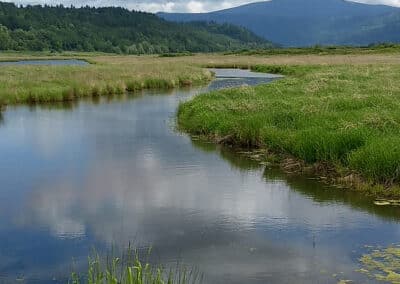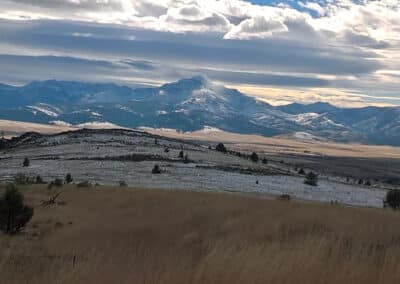Navel Staring is Killing Salmon
Or How Ecology Has Turned the Clean Water Act into a College Paper
by Nina Bell • February 20, 2020 •
Lately, EPA has been looking into how much climate change has already warmed some Northwest rivers and predicting how much worse it’s going to be in the coming decades. The results are sobering, in part because we already know that our rivers are currently too hot for salmon and steelhead.
You would think that getting the really bad news on what these cold-water fish face in the coming decades might light a proverbial fire under EPA and Washington State to do something different.
You would be wrong. EPA’s recent approval of the Washington clean-up plan for temperature pollution in the South Fork Nooksack River basin shows just how much EPA and the Washington Department of Ecology view this as an academic exercise. Like nothing more than writing a term paper.
There are lots of strange details in this clean-up plan but the most bizarre is why Ecology chose to do it in the first place. Let’s set the stage.
Thing One: For over 20 years, Ecology has agreed to not use these clean-up plans to improve logging practices in Washington. So, when Ecology started this project, it already knew that to develop a clean-up plan for a basin dominated by commercial logging lands was an utterly pointless exercise.
So it’s fair to say that the South Fork Nooksack clean-up plan was, sadly, ready-made for the purpose of achieving nothing.
Thing Two: Having spent eight years on developing this expensive clean-up plan in which EPA and Ecology determined that even if all the trees are left standing and new ones are planted, not only will climate change make it near impossible for salmon to survive but it’s a race against time. It takes time for trees to grow, quite a lot of time.
Thing Three: The agencies conclude it’s a five-alarm fire. All the stops need to be pulled out to save the salmon in the South Fork Nooksack from high temperatures. All. Even all the small streams need maximum shade—including the streams that current logging rules don’t protect.
And here’s the thing about those small streams. Mostly upstream of salmon habitat, these smaller streams typically make up 75 percent of the total stream network. In other words, the individual streams are small but their coverage is vast. It just so happens that Washington has finally published a study that proves that existing state logging rules are causing these small streams to warm up.
So, to tie this up in a bow, Ecology’s and EPA’s South Fork Nooksack clean-up plan says that to counter climate change and the effects of existing logging practices, maximum shade is needed on all the rivers and small streams across the basin. But here’s the kicker: to achieve that end, the Washington Department of Ecology proposes to use the very same logging practices that the state just proved do not work. EPA happily approved the plan.
Ecology wrote the South Fork Nooksack clean-up plant to save the salmon.
But in the face of certain disaster, the plan is to do nothing.



